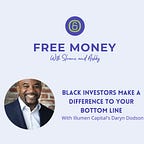Black lives matter.
And not just in the abstract. When given the proper space and support, Black investors can materially improve portfolio returns. But that almost never happens. In aggregate, only about 1% of the $70 Trillion managed by professional investors is overseen by minority-owned firms.
On this episode of Free Money, we were fortunate to speak with Daryn Dodson, a Managing Director at Illumen Capital who knows perhaps more than anyone else what needs to be changed in order to create a more equitable future. We spoke on Friday, June 5th. And because the perspective he shared was so valuable, we decided to dispense with our regular essay and include a transcript of the conversation instead.
Enjoy!
Ashby Monk (10:44):
We were just kind of talking through the issues of the week, obviously a pretty heavy week out there and wanted to connect with somebody who could really explain a couple of things. You know, why the asset owner community isn't doing more to support the managers that are people of color, but even before we get there, how are you doing?
Daryn Dodson (11:13):
I am a hosting a group in a conversation of a hundred billion dollars in asset allocators to put a through line from slavery to lynching, to mass incarceration, to tuck that into the asset management overlay so that people can understand how assets got to be so imbalanced and the huge disparities that lead to suboptimal returns for our portfolios. They also violate fiduciary duty. We have about 30 hours of work over the weekend. So
I just finished the opening session. We offer for a lot of our investors at Illumen Capital something called the Illumen impact experience to bring them together, to put these dots together. So I'm heartened by that work. A lot of this is doing the work to move capital in ways that's optimal as I've worked with Dr. Jennifer Eberhart, and as well as Dr. Ashby monk to hit to work on this paper, uh, with a few other authors, really to prove and show the bias managers of color face as they increase performance, particularly black managers. So after we proved that in a paper and published it, then the question becomes, what do we do about it?
A lot of people are making statements all over the country around how they value communities of color and black communities. But when you look at their balance sheets, I've been kind of thinking about things like, not public statements, but balance statements and financial statements, and whether those mirror the statements that people are making publicly. So that's something we believe in as a firm at Illumen Capital. It's something that is evidenced in the paper that we published. It's something that we share with our investors, who currently manage over a trillion dollars in capital so that they can begin to apply these ideas to their broader portfolio.
Sloane Ortel (13:15):
Let me just hone in on a sub point of that. I think throughout history, whether through red lining or another process, you might want to name, the financial community has been a big player in perpetuating inequality, perpetuating in effect segregation. Is it still happening in your view?
Daryn Dodson (13:31):
In terms of my background, I spent three years, with the center for responsible lending and 60 attorneys passing laws to reduce predatory lending. And we also proved through a data-driven hypothesis and execution of $6 billion in loan pools and proof points, the low income women and people of color, particularly black and Latino communities were overcharged for mortgage loans. And we wrote several papers about that back then, that led to the shifting of 18 laws across the country, based on the evidence of the overcharging and taxing of the number one way in which low-income particularly black communities reached the middle class, which is home ownership.
So systematic overcharging above risk on communities, where when you overlay GIS statistical mapping data with different mortgage databases to prove that indeed banks were overcharging families, mothers, fathers that were black and Latino relative to their white counterparts and their biggest opportunity to create wealth in their life.
And is it still happening? Part of the reason I went to business school at Stanford business school, it was because I was sick from seeing the practices in the mortgage lending markets. And after working with a team of 60 attorneys to pass national frameworks, watch businesses transform and change those laws back and undercut a lot of the laws that were on the books to protect well income homeowners. So now in this strategy at Illumen capital we invest in 10 private equity funds, systematically require and partner with them to do 10 years of implicit bias reduction work as a part of our investment and unlock the impact and returns within our portfolio is a part of our systemic change. Since the passing of laws do not work to sustain those protections against women and people of color, particularly black people.
Sloane Ortel (15:32):
That's fascinating. And in the process of doing that, you must encounter tons of people who come into it thinking they're not racially biased, but yeah, nonetheless, make these racially skewed decisions, whether it's where to get a cup of coffee or who to back, how do you counteract that tangibly?
Daryn Dodson (15:50):
Well, I think the most interesting thing is that they don't realize that they're leaving returns on the table. So they may not realize that they're racially biased, but what is the incentive to reduce the bias? One is that you miss the people in the human condition, that maybe are wonderful additions to your life. The other is you missed your fiduciary duty to invest the billion or trillion dollar corpus on behalf of the communities, whether they're pension funds or retirement programs or foundation endowments or family offices or university endowments.
And I think that there's a long way to go in university endowments and pension funds as Ashby knows, I think better than most in the world And that's part of the reason why we partnered together with Ash and, you know, his incredible work and research cross pension funds. So take a deep look and help them to understand that unless they do the work, we are going to leave money on the table. And not only that they'll sort of undercut the best fund managers that are in their pipeline, through their biases without doing the work.
Ashby Monk (17:03):
Yeah. That has been such a rewarding project for me in part, because we've been able to make the case quite clearly, that they're leaving returns on the table. They're not assessing all of the opportunities in the same manner, which means that any bias, we see them investing and we have many biases, right? There's status quo bias, there's geographic bias, home bias. This is a bias that distorts the decision making of investors, asset allocators. We showed that in the PNAS study. And so we can go back to them and say, look, you're leaving money on the table. It's your fiduciary duty now to build processes that reduce this implicit bias so that you can maximize the performance. But Darren, I really want to hear a little bit more about, Illumen loved hearing the kind of prior narrative about your, I didn't actually know that story.
Sloane Ortel (17:54):
That was just wild.
Ashby Monk (17:57):
That's what sent you to go study with us at Stanford, but what are you doing now with Illumen? I think it's such a compelling story that maybe you could just do, you know, 30, 45 seconds on, on Illumen.
Daryn Dodson (18:09):
Sure. Illumen capital is a private equity venture capital fund of funds. We'll select, uh, 10 managers that are working on different themes of transformation within key systemic leverage points within the world. They vary from themes around financial innovation, inclusive financial innovation. I'll just put that in there due to my background and experience in watching the extractive financial innovation, environmental transformation on transit, improve outcomes and health outcomes in communities around the world.
We also are invested in some of the leading ed tech firms in the world who, of course, if they don't reduce bias, the AI and machine learning the acceleration of algorithms will repeat the same biases that are present in school systems. Many listeners may know that for X amount of black students are currently expelled relative to their white peers within that school system currently in K-8 reading levels, school levels. And if we repeat those biases within the minds of the teachers as we build these technologies, that's a huge challenge for business models because the federal government likes to see things grow in ways that are equitable, but it's also a huge challenge generally for those of us that love equity and justice and inclusion.
So part of what Illumen Capital has done from inception is it also includes a partnership with Stanford SPARQ and Dr. Jennifer Eberhardt's research center. She's one of the leading thinkers on implicit bias in the world. And in fact, published the book bias, which were included in, and part of the reason why that's so important, it was because that we knew when we went out to, uh, work on the thesis that Ashby and I worked on with Dr. Eberhart found that and on our journey that without a credible backing from a fabulous institution like Stanford, it would be difficult for people to believe something that by definition that they could not see, which is actually what bias is. So we have to make that palpable, tangible, help him to see it, which is the mission of our partnership with Stanford, for finding the tools to reduce bias within the investments that we make.
Sloane Ortel (20:35):
I'm just fascinated. It occurs to me that some of our listeners may think that we're talking about essentially a philanthropic activity, even though it's a pure private equity fund of funds. I wonder if you could tell us a story of like, from intervention through to internal rate of return of how this sort of intervention made money?
Daryn Dodson (20:54):
Yeah. I think, um, you know, we're, we're, we're two years in right now, so it's quite early, but Hey, you know, some of the early evidences that we've seen managers invest in companies that they wouldn't otherwise have seen without our process, much of the work that we do is confidential. And the reason why that is, is because we believe there's $35 trillion in undervalued assets within the $70 trillion in the asset management business. And because we have a competitive strategy to help people see how those undervalued assets work, we don't reveal kind of the process of reducing bias within our firm to those other than the investors that we have. I think, you know, it'd be like Google putting its algorithm out there and saying, this is our algorithm.
But let me see if I can help on a, you know, a previous career example, you know, there's a education tech company that's in front of, uh, 90% of all kids in the country. The potential of them to realize what I just said around the 4x expulsion rates of black kids before they begin a strategy to go in and put images in front of kids by translating the New York times wall street journal and other reading material to kids on K through eight level. Imagine if the New York times were translated in front of kids today, and it doesn't take much to imagine how you'd need to filter out the images that could destroy the future imagination and capacity of kids to overcome the images that they're seeing of people that look like them, particularly for black kids as they’re kind of taking in the images across the country and the world.
So without kind of thinking together around strategies like that the business model breaks because the company is reinforcing biases and instead of unlocking the imagination innovations are the future within the minds children rather than reducing them and allowing that forcing function that we need as a society to take place.
Ashby Monk (23:00):
That's great. I might ask another question here on, I think we run this podcast largely because we're trying to talk about, you know, the biggest investors in the world, pension funds, sovereign funds and the system of capitalism that we're all a part of today is increasingly powered by these big longterm investors. They provide the capital to the professional money managers, which in turn provide money to companies and projects that need it. And this chain of intermediaries kind of flows through the entire system.
And so unraveling all of this is kind of part of what we're trying to do with this podcast. Darren is we're trying to like explain what pension funds and sovereign funds are to the world that, you know, so that they can understand this system of capitalism, what I've noticed and the work that I've done around climate change is that the forest fires in California and the, the fires in Australia, terrible crises have, have forced the trustees of these fiduciary bound investors to start to take climate change seriously.
Is there a moment now where this is a moment similar to the climate change story, where we can take this terrible tragedy and the protests around the country and bring this issue into the boardroom of the biggest investors on earth and sort of demand that they pay attention?
Daryn Dodson (24:25):
Well, I think not only could we, but I think we've gone too far now to turn back from that commitment.
One of the things that, of the many good things that happened in the civil rights movement, one thing that didn't happen is that the push for optimal asset allocation that would include brilliant black fund managers and latino fund managers, and women, and people of color across the world never happened. And that's the backbone of the muni bonds, you know, across different strategies. It's the backbone of the ways that we fuel ed tech that is proliferating around the world, it's educating all of the students around the world, it's building the infrastructure in ways that systematically leaves out communities. So without a critical analysis of this time around, and this moment in time, that includes the $70 trillion in assets that are the backbone of the global financial markets, we'll never be able to really have black lives matter or other lives matter across the country. Or in the world.
So I think that, you know, one of the laser focuses of a capitalism mission is to execute on our vision, to invest in the funds, reduce bias, and increase returns, and enable our investors to out compete others by applying similar technology. So if you're at a pension fund and this isn't part of your thinking, I think that you've run the risk of being lifted behind and worse risk of leaving the retirements of so many people. And, you know, some would wonder why pensions underperform relative to what many would expect. And I think this is one of those big reasons. And as I've learned from Ashby relative to the climate movement, although there are lots of really important things to hit right on climate we're actually rather than limiting the total set of investing assets by not including the optimal women and people of color run funds, which are the optimal funds that have traditionally been left out of the analysis.
And when included in the analysis, these often don't get invested in when we leave them out, we shrink the universe of total potential opportunities. Modern portfolio theory would suggest that is a bad idea. Something is deeply broken in our system. It's something that hurts our returns. It's something that creates systematic bias across many of the asset pools in the world. And, uh, that's not a good thing, whether it's confirmation bias or anchoring bias, as Ashley shared earlier, it's a about looking at the opportunity on the other side of reducing bias, as I mentioned before where we'd be normally distributed, we're underweighted $35 trillion in women and people of color. Let’s put it like that.
Ashby Monk (27:17):
I love that you brought that up because it is something I'm constantly reminding folks that unlike the climate change space, where we're in effect, asking people to reduce the size of their portfolio in order to minimize the effects of climate change, racial biases already minimizing the portfolio. And what we're asking you to do is open your eyes to the entire portfolio of investable assets, which it's your duty to do. And so this should be a much easier ask actually of the fiduciary bound investors. We're asking you to consider all the investable universe, which is your duty to do. Thank you for reminding me...










